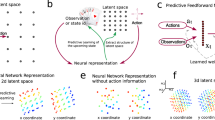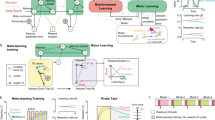Abstract
Long after a new language has been learned and forgotten, relearning a few words seems to trigger the recall of other words. Neural-network models1,2,3 indicate that this form of spontaneous recovery may result from the storage of distributed representations, which are thought to mediate human memory. Here we use a psychomotor learning task to show that a corresponding effect of spontaneous memory recovery occurs in human subjects.
This is a preview of subscription content, access via your institution
Access options
Subscribe to this journal
Receive 51 print issues and online access
$199.00 per year
only $3.90 per issue
Buy this article
- Purchase on Springer Link
- Instant access to full article PDF
Prices may be subject to local taxes which are calculated during checkout

Similar content being viewed by others
References
Hinton, G. E. & Sejnowski, T. J. in Parallel Distributed Processing (eds Rumelhart, D. & McClelland, J.) 282–317 (MIT Press, Cambridge, Massachusetts, 1986).
Hinton, G. E. & Plaut, D. Proc. Ninth Annu. Cogn. Sci. Soc. 177–186 (1987).
Harvey, I. & Stone, J. V. Neural Comp. 8, 697–704 (1996).
Ebbinghaus, H. Über das Gedachtnis (Dunker, Leipzig, 1885).
Author information
Authors and Affiliations
Corresponding author
Rights and permissions
About this article
Cite this article
Stone, J., Hunkin, N. & Hornby, A. Predicting spontaneous recovery of memory. Nature 414, 167–168 (2001). https://doi.org/10.1038/35102676
Issue Date:
DOI: https://doi.org/10.1038/35102676
Comments
By submitting a comment you agree to abide by our Terms and Community Guidelines. If you find something abusive or that does not comply with our terms or guidelines please flag it as inappropriate.



